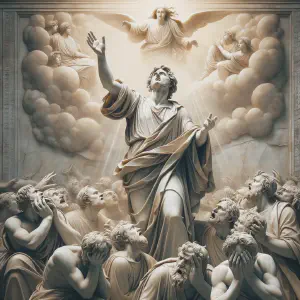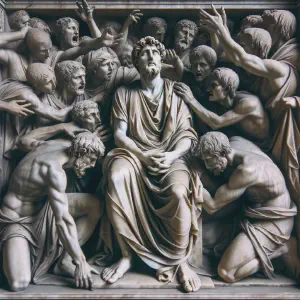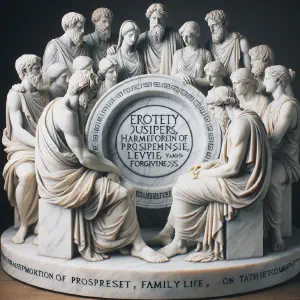The Witness of Stephen



In a distant time, Jesus had forewarned his disciples of such trials. He cautioned them about the persecutions they would face, handed over to courts and scourged in synagogues. Yet, He promised the guidance of the Holy Spirit, ensuring that in their time of trial, it would not be they who spoke, but the Spirit of the Father speaking through them. This prophecy found its fulfillment in Stephen, who stood as a testament to enduring faith in the face of overwhelming adversity.
Five Questions
What significance does Stephen’s vision of Jesus standing at the right hand of God hold, especially in the context of his impending martyrdom?
Stephen’s vision is profoundly significant as it serves as a divine affirmation of his faith and mission. Seeing Jesus at the right hand of God symbolizes Christ’s power and authority, offering Stephen a glimpse of heavenly glory amidst his suffering. This vision not only strengthens Stephen’s resolve but also testifies to the truth of Jesus’ resurrection and ascension, providing a source of comfort and assurance in his final moments.
How does Stephen’s response to his accusers and executioners reflect the teachings of Jesus, particularly regarding loving one’s enemies?
Stephen’s response mirrors Jesus’ teachings on love and forgiveness. Despite the violence and hatred directed at him, Stephen doesn’t succumb to anger or seek revenge. Instead, he asks for forgiveness for his executioners, much like Jesus did on the cross. This act of forgiveness and love, even towards those causing him harm, exemplifies the core Christian values of compassion and unconditional love for all, even enemies.
Can you draw parallels between the role of the Holy Spirit in Stephen’s story and the guidance promised by Jesus to His disciples in Matthew 10?
Yes, there’s a clear parallel. In Matthew 10, Jesus promises that the Holy Spirit will guide His disciples and speak through them in times of persecution. Stephen’s story is a direct manifestation of this promise. The wisdom and grace with which Stephen speaks, and his unwavering faith even in the face of death, are testaments to the Holy Spirit’s presence and guidance, fulfilling Jesus’ assurance to His followers.
What lessons can modern Christians learn from Stephen’s martyrdom and his steadfast faith during persecution?
Modern Christians can learn the importance of unwavering faith and the power of witness in the face of adversity from Stephen’s martyrdom. His story teaches us that true faith often involves trials and sacrifices. It also shows that in moments of great challenge, strength and courage can be found through the Holy Spirit. Stephen’s example encourages Christians to stand firm in their beliefs, even when confronted with opposition or persecution, and to trust in God’s ultimate plan and providence.
Reflecting on Psalm 31, how does the theme of entrusting oneself to God resonate with the experiences of Stephen and the teachings of Jesus?
Psalm 31’s theme of entrusting oneself to God is deeply resonant with both Stephen’s experience and Jesus’ teachings. The psalm speaks of God as a rock of refuge and a fortress of safety, echoing the trust and surrender to God’s will that both Jesus and Stephen exhibit. In the face of suffering and death, Stephen, like Jesus, commits his spirit to God, demonstrating a profound faith and reliance on God’s protection and redemption. This act of surrender teaches Christians the importance of placing their complete trust in God, especially during times of hardship and uncertainty.
Bible Study
Acts 6:8-10; 7:54-59
Stephen, filled with grace and power,
was working great wonders and signs among the people.
Certain members of the so-called Synagogue of Freedmen,
Cyrenians, and Alexandrians,
and people from Cilicia and Asia,
came forward and debated with Stephen,
but they could not withstand the wisdom and the spirit with which he spoke.
When they heard this, they were infuriated,
and they ground their teeth at him.
But he, filled with the Holy Spirit,
looked up intently to heaven
and saw the glory of God and Jesus standing at the right hand of God,
and he said,
“Behold, I see the heavens opened and the Son of Man
standing at the right hand of God.”
But they cried out in a loud voice, covered their ears,
and rushed upon him together.
They threw him out of the city, and began to stone him.
The witnesses laid down their cloaks
at the feet of a young man named Saul.
As they were stoning Stephen, he called out
“Lord Jesus, receive my spirit.”
This passage describes Stephen, one of the first deacons of the Church, known for his exceptional faith and ability to perform wonders and signs. Stephen’s eloquent defense of his faith in the face of fierce opposition exemplifies the virtue of fortitude. His martyrdom, as he is stoned to death, is the first in Christian history, underscoring the theme of sacrifice for one’s beliefs, a fundamental Catholic value. His actions align with the Catholic understanding of bearing witness to Christ, even unto death, and the importance of grace in moments of trial.
Psalm 31:3cd-4, 6 and 8ab, 16bc and 17
R. (6) Into your hands, O Lord, I commend my spirit.
Be my rock of refuge,
a stronghold to give me safety.
You are my rock and my fortress;
for your name’s sake you will lead and guide me.
R. Into your hands, O Lord, I commend my spirit.
Into your hands I commend my spirit;
you will redeem me, O LORD, O faithful God.
I will rejoice and be glad because of your mercy.
R. Into your hands, O Lord, I commend my spirit.
Rescue me from the clutches of my enemies and my persecutors.
Let your face shine upon your servant;
save me in your kindness.
R. Into your hands, O Lord, I commend my spirit.
Psalm 31 is a prayer of trust and deliverance, traditionally attributed to King David. It reflects the theme of God as a protector and savior in times of distress. The psalm aligns with Catholic teachings on God’s providence and mercy, emphasizing reliance on God’s strength and guidance. The psalmist’s commitment of his spirit into God’s hands parallels Jesus’ last words on the cross and is echoed in Stephen’s final act of faith. This psalm reinforces the Catholic values of trust in God and seeking divine refuge during hardships.
Matthew 10:17-22
Jesus said to his disciples:
“Beware of men, for they will hand you over to courts
and scourge you in their synagogues,
and you will be led before governors and kings for my sake
as a witness before them and the pagans.
When they hand you over,
do not worry about how you are to speak
or what you are to say.
You will be given at that moment what you are to say.
For it will not be you who speak
but the Spirit of your Father speaking through you.
Brother will hand over brother to death,
and the father his child;
children will rise up against parents and have them put to death.
You will be hated by all because of my name,
but whoever endures to the end will be saved.”
In this passage from the Gospel of Matthew, Jesus warns His disciples of upcoming persecutions. He emphasizes the role of the Holy Spirit in guiding their responses during trials. The passage highlights the Christian virtues of perseverance and trust in divine providence, consistent with Catholic teachings on the Holy Spirit’s guidance. It also touches on themes of martyrdom and witness, resonating with the life of Stephen as well as the broader Catholic understanding of suffering for faith as a path to ultimate redemption. Jesus’ message underscores the importance of steadfastness in faith in the face of adversity, a core Catholic value.
Lessons
These sacred readings teach us the profound truth of faith’s endurance in the face of persecution. Stephen’s unwavering belief, even as he faced death, exemplifies the courage and grace granted by the Holy Spirit to those who trust in God. The psalms reinforce this message, encouraging us to commend our spirits to the Lord, our rock and fortress. Jesus’ forewarning to His disciples about trials and persecutions serves as a reminder of the cost of discipleship, yet also of the divine guidance and strength provided to those who faithfully bear witness to His name. These passages invite us to reflect on the depth of our faith and the strength of our commitment to God’s truth, especially in times of trial.
Meditation Prayer


